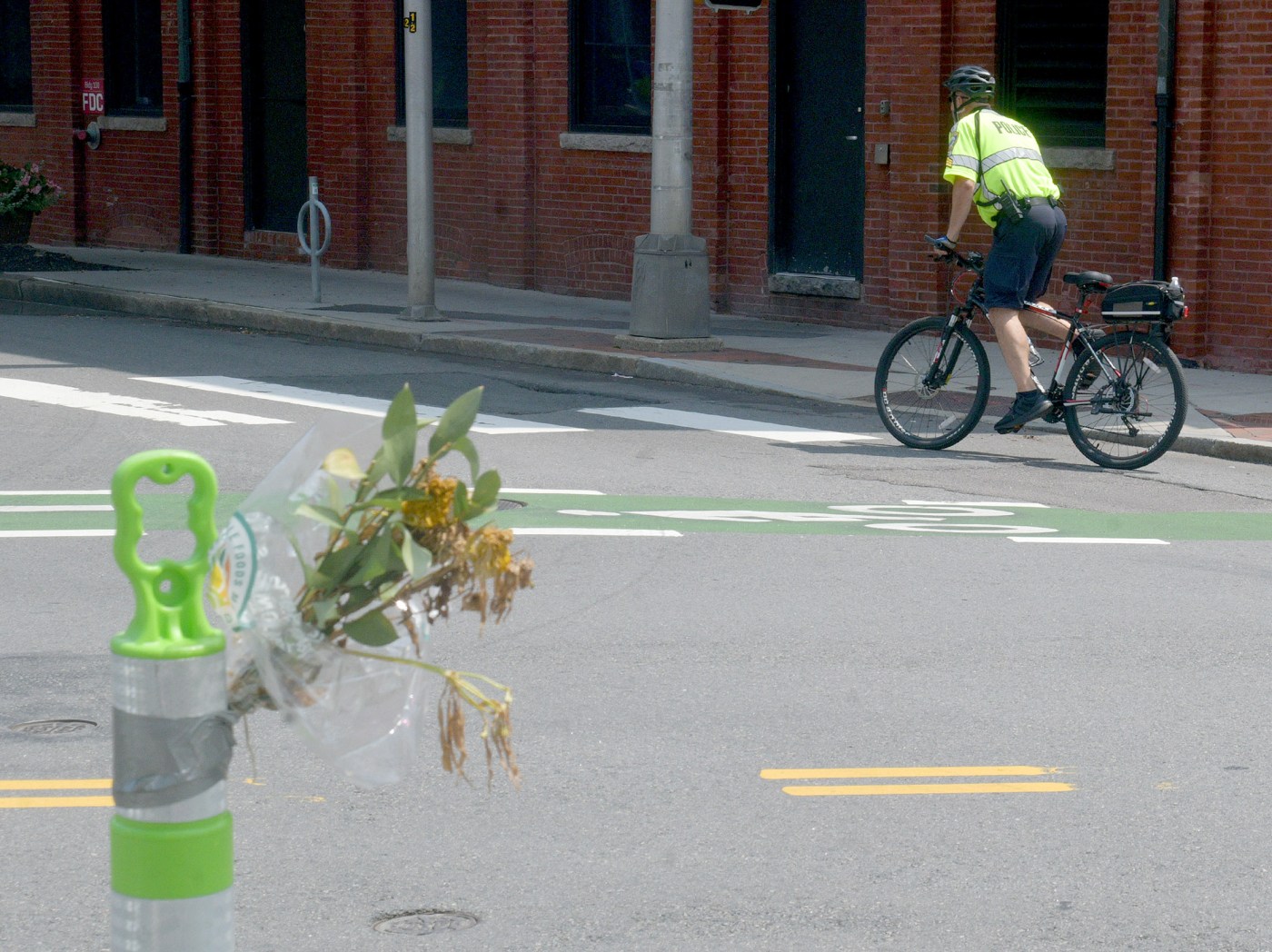
Massachusetts truck safety regulations spur division in wake of Cambridge cyclist deaths
Opposition from a state municipal lobbying group over regulations that look to bolster safety around large trucks has drawn the ire of elected officials in Cambridge, where two cyclists have died after being struck in recent weeks.
All state-contracted trucks must be equipped with side guards, improved mirrors and backup cameras by January 2025, an order the Massachusetts Municipal Association says is “not reasonable for cities and towns.”
The private nonprofit says it understands the need for “reasonable measures to help to reduce injuries and fatalities on our roadways.”
The regulations, however, are “an unreasonable ask and considerable overstep of regulatory authority,” MMA’s executive director and CEO Adam Chapdelaine wrote in testimony to the state Department of Transportation.
A pair of Cambridge city councilors took to social media after listening to MMA’s testimony during a MassDOT hearing on Friday.
“These regulations will save lives,” Vice Mayor Marc McGovern posted on X. “They would have saved the lives of Kim Staley and Minh-Thi Nguyen.”
Councilor Jivan Sobrinho-Wheeler added, “@massmunicipal does not represent Cambridge or plenty of other municipalities on this. When they say they speak for ‘all cities & towns’ in Massachusetts against side guards and other safety features on trucks in municipalities, they don’t speak for us.”
Staley, 55, of Florida, died on June 7 when the driver of a box truck struck her at the intersection of DeWolfe and Mt. Auburn streets, close to Memorial Drive along the Charles River. The truck, which reportedly lacked side guards, turned right as the cyclist traveled straight across, according to authorities.
Two weeks later, on June 21, Nguyen, a third-year physics graduate student at MIT, died at age 24, when a box truck driver struck her at the intersection of Hampshire and Portland streets.
A day before Nguyen’s death, MassDOT sent a guidance memorandum to contractors, subcontractors and municipalities, outlining the so-called “Act to Reduce Traffic Fatalities.”
The law specifically requires “a motor vehicle, trailer, semi-trailer or semi-trailer unit classified as a class 3 or above” to be equipped with a lateral protective device, convex and crossover mirrors, and backup cameras by Jan. 1, 2025.
It will apply to vehicles leased or purchased by the state or operating under a state contract after the new year. Ambulances and other emergency medical vehicles, firetrucks, agricultural tractors and state-owned vehicles leased or purchased before 2023 will be exempt.
Chapdelaine took exception to how the law includes municipal contracts funded with state aid through MassDOT and requires that any providers contracting with municipalities must comply.
Chapdelaine estimated that 90% of each municipal DPW fleet alone would require retrofits that would cost anywhere from $2,500 to $5,000.
“We strongly support making necessary changes to reflect the true intent of the legislation and the legal underpinning of the updated state law,” Chapdelaine added in a statement to the Herald later Friday.
Charlie Baker signed the bill on one of his last days in the governor’s office. It also requires drivers to maintain a four-foot buffer when they pass construction workers, emergency responders, pedestrians and cyclists, and established a process for municipalities to request lower speed limits on state-owned roadways.
So far this year, 11 people have been killed in crashes with large trucks across Massachusetts, according to MassBike. Within the past decade, 28% of fatal bike crashes have involved large trucks, the organization states.
Boston, Cambridge, Somerville, and Newton, have already enacted similar requirements for their respective municipal agencies and contractors.
Charlotte Fleetwood, a senior transportation planner in Boston, said the ordinance is “not perfect but we believe it has saved lives.” The city recently purchased surround cameras for all of its large fleet vehicles, and officials are working with MassDOT to measure blind zones, she said.
Fleetwood is calling for federal action to require large vehicles be designed to be “inherently safer without these large blind zones and side cavities.”
In late March, a 4-year-old girl, Gracie Gancheva, of Denver, Colorado, died after being struck by a truck driver at an intersection near Boston Children’s Museum. Days later, a cement truck driver collided with and killed a 57-year-old man, Fernando R. Pizzaro, in a wheelchair at another South Boston intersection.
“We need to end this harm, and we can do it,” Fleetwood said.
Owners subject to the law must certify that their motor vehicle is equipped with the required devices, with certification and necessary documentation submitted to the Registry of Motor Vehicles.
Owners may apply for a waiver if their vehicle can’t comply due to the design, operation or other safety considerations.
The regulations have blindsided municipal officials across the state, said Bob Szocik, director of public works in Templeton, a town of roughly 8,000 in northern Worcester County.
“My heart goes out to all of the tragedies that have happened,” he said, “but from the municipality standpoint, we have not been reached out and notified about this change.”
The lack of notification will impact town budgets, Szocik said. Templeton expects to increase its fleet with new trucks in December, he added.
“Can I catch them and have them outfitted?” Szocik asked during MassDOT’s hearing. “Where am I going to get the extra money? It’s not fair to us in a short amount of time.”
Andover resident Eric Olson has turned tragedy into advocacy. His 5-year-old daughter, Sidney Mae, died in May 2023 after being struck by the driver of a tractor-trailer at a busy intersection in Merrimack Valley town.
An investigation into the tragedy found the driver not at fault, Essex County District Attorney Paul Tucker announced last November. The driver did not face any criminal charges.
Olson has been pushing for side guards to be required on all trucks, encouraging MassDOT to provide incentives and grants to business owners to make their vehicles safer.
“Her death shows up as a number – one,” Olson said. “But, its impact is far more rippling. … Every day, we put the livelihood and the well-being of truck drivers at risk by not properly equipping them with safety equipment. One crash can ruin a career and shatter a life.”


